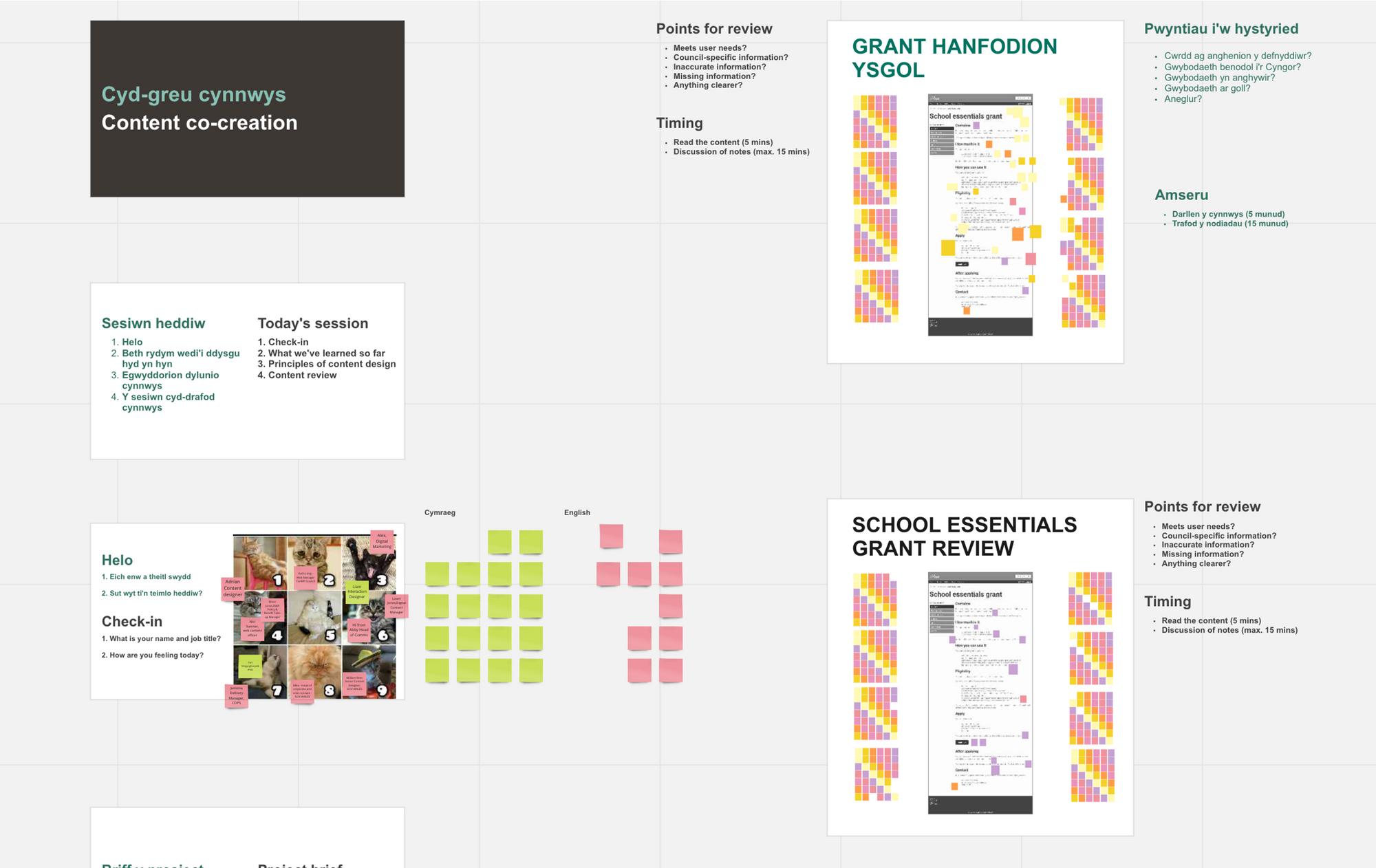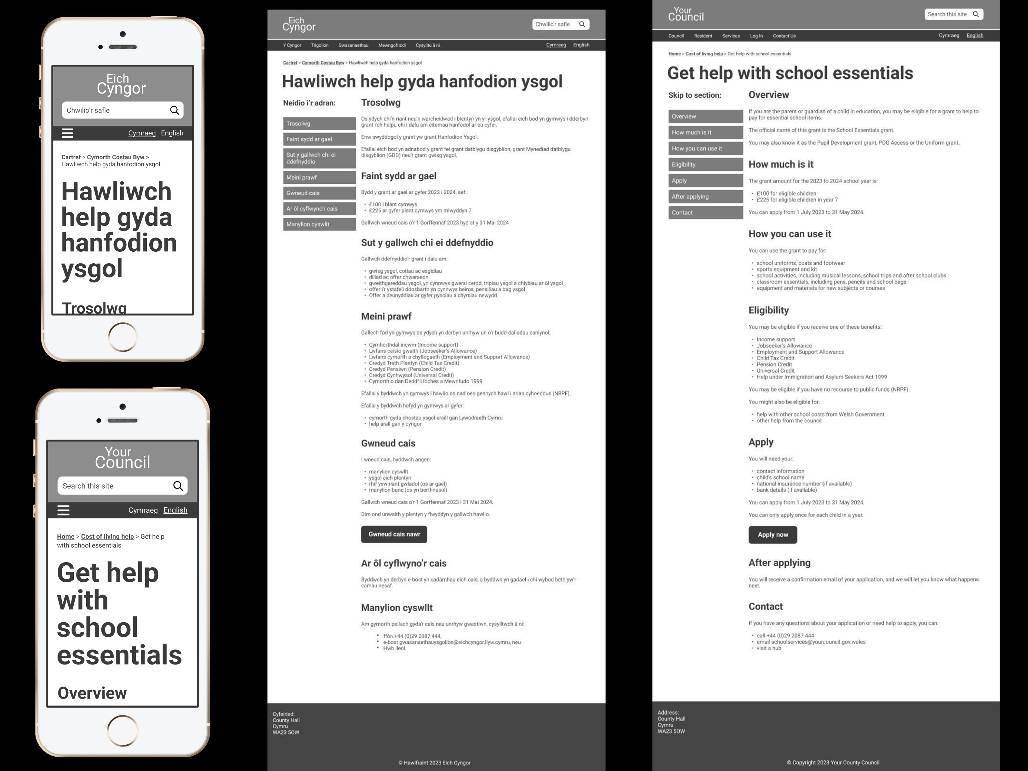Contents
Overview
These are the steps that we took whilst working on co-designing content for the School Essentials grant.
We have also published reusable content, tools and templates that you can use for your own local authority sites.
User stories
Following desk research, we developed user stories. These allow us to understand the motives of our users and how this content can help them.
As a… person in need of financial help
I want to… know who this grant is for
So that I… can decide whether to apply or not.
As a… parent or guardian in need of financial help
I want to… know what this grant is for
So that I… can understand what I can use it to buy.
As a… parent or guardian in need of financial help
I want to… know what the eligibility criteria is
So that I… don't apply for support I'm not eligible for.
As a… person applying for this grant
I want to… know when I need to apply
So that I… don't miss the deadline.
As a... person applying for this grant
I want to... understand how to apply
So that I... can make sure I follow the right process
As a… person applying for this grant
I want to… know what information I need to apply
So that I… can have all the information ready.
Acceptance criteria
We use acceptance criteria form the perspective of the user. They allow us to know when we have succeeded. The job is done when:
I know...
- if I’m eligible or not for the grant
- what the grant is for
- what the eligibility criteria is
- when I need to apply
- how to apply
- what information I need to apply
- what happens next
I feel... reassured that I understand everything I need to apply for this grant
I can... apply for the grant successfully
Workshops
We ran online workshops during the project. They were for:
- reviewing the existing content for the School Essentials Grant alongside local authorities
- trio writing new content
- reviewing the new content with local authorities and Welsh Government stakeholders
Read ou guide: How to do trio writing
Read Ceri’s account about her role as a translator on the project
Read Adrián's reflections on the standard approach to translation and trio writing

Prototyping
We built a prototype to test and develop ideas with users.
We built a medium-fidelity interactive prototype in a programme called Figma. Figma is a ‘no-code’ piece of software which meant it was a solid choice for quickly building the environment to house the bilingual content we had designed.
We designed it to feel familiar to users, with:
- Gov stylings
- a mixture of local authority websites
- both desktop and mobile versions
Once these were designed we had to test them with potential users. We tested it depending on the device a participant would usually use.

Usability testing
We conducted a round of usability testing to review and test the prototype School Essentials Grant web page. This prototype had the new content drafted with input from local authorities.
Goals of the usability testing
We wanted to know whether users found this content understandable, accurate, consistent and accessible. In particular, we wanted to find out:
- if the content was clear and easy to understand
- whether the content contained all the right information
- if the Welsh language content was of an equal standard to the English
Participants
We planned to recruit 6 participants to test the prototype, 3 who were first-language English to test the English content and 3 who were first-language Welsh to test the Welsh content.
Recruitment proved challenging and ultimately, we were only able to recruit 4 participants within the 3-week timescale, 2 Welsh-language and 2 English-language.
How we did it
We conducted the testing remotely and asked participants questions about:
- the structure of the content
- how easy it was to understand the content
- whether the content contained all the information the participant needed
Findings
All 4 participants felt that the content was clear and easy to understand and generally contained the correct information.
Some more constructive insights also came out of the testing. These were analysed and the following recommendations were made based on those insights:
- Encourage local authorities to replace their current School Essentials Grant content with the new content. Our testing showed that participants far preferred the new content over what their local authorities currently offer.
- Continue with the trio writing to ensure Welsh language content is developed to the same standard as the English. And continue to ensure that a ‘neutral’ language is maintained.
- Design for mobile first. Participants are more likely to access this content on their mobile phones.
- Include the English names of benefits on the Welsh language pages. Even though this may seem to contradict Welsh Language Standards, we have evidence that shows that this would help to meet some users’ needs.
- Encourage LAs to include information about their timescales. Testing showed that this is important to users who want to plan and budget.
Content templates
School Essentials grant content 2023 to 2024.docx
Content that you can reuse on your local authority website about the School Essentials Grant.
School essentials grant phrase book 2023 to 2024.docx
Tailor the content to the specific needs of your council with sentences from this phrasebook.
School Essentials grant HTML English.html
You can reuse this HTML version of the English-language School Essentials Grant content.
School Essentials grant HTML Cymraeg.html
You can reuse this HTML version of the Welsh-language School Essentials Grant content.
Watch our show and tell
Contact us
Contact ed.cann@digitalpublicservices.gov.wales to take part in future projects with us.